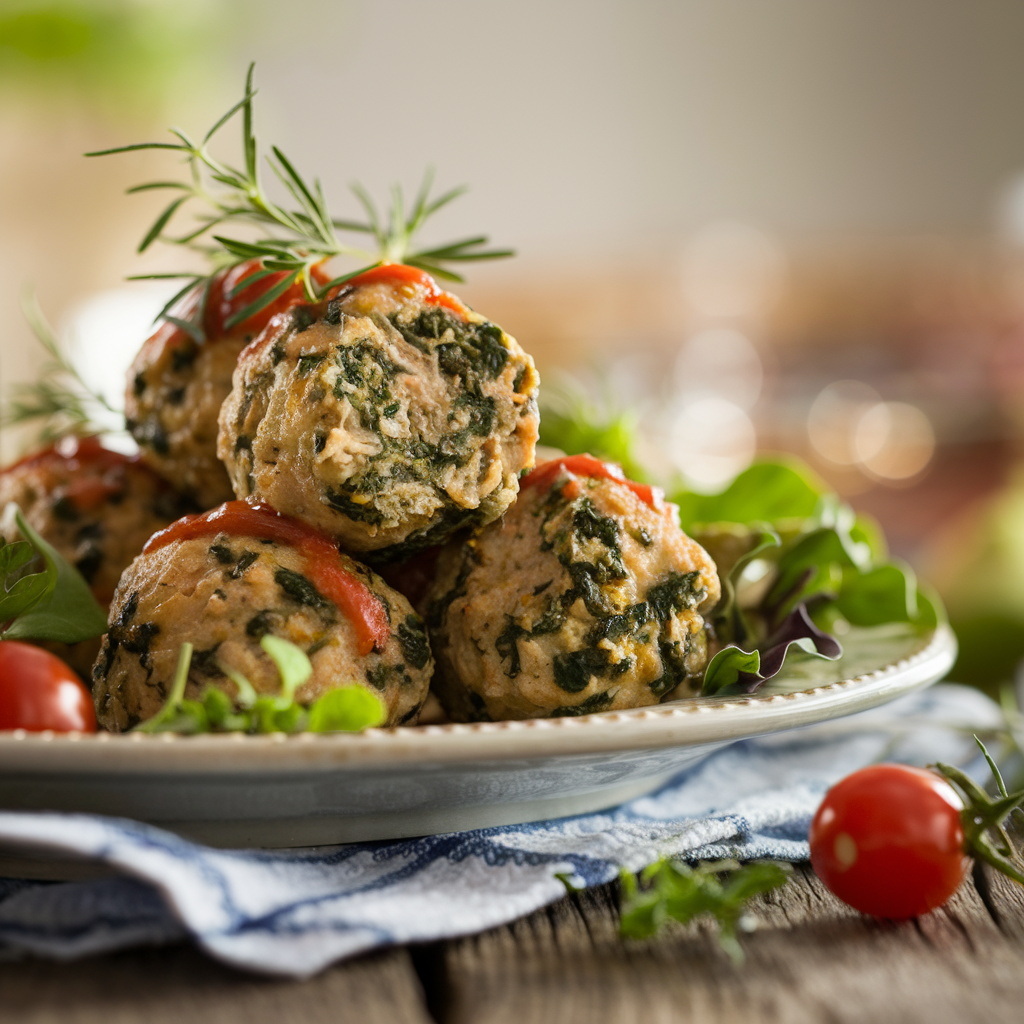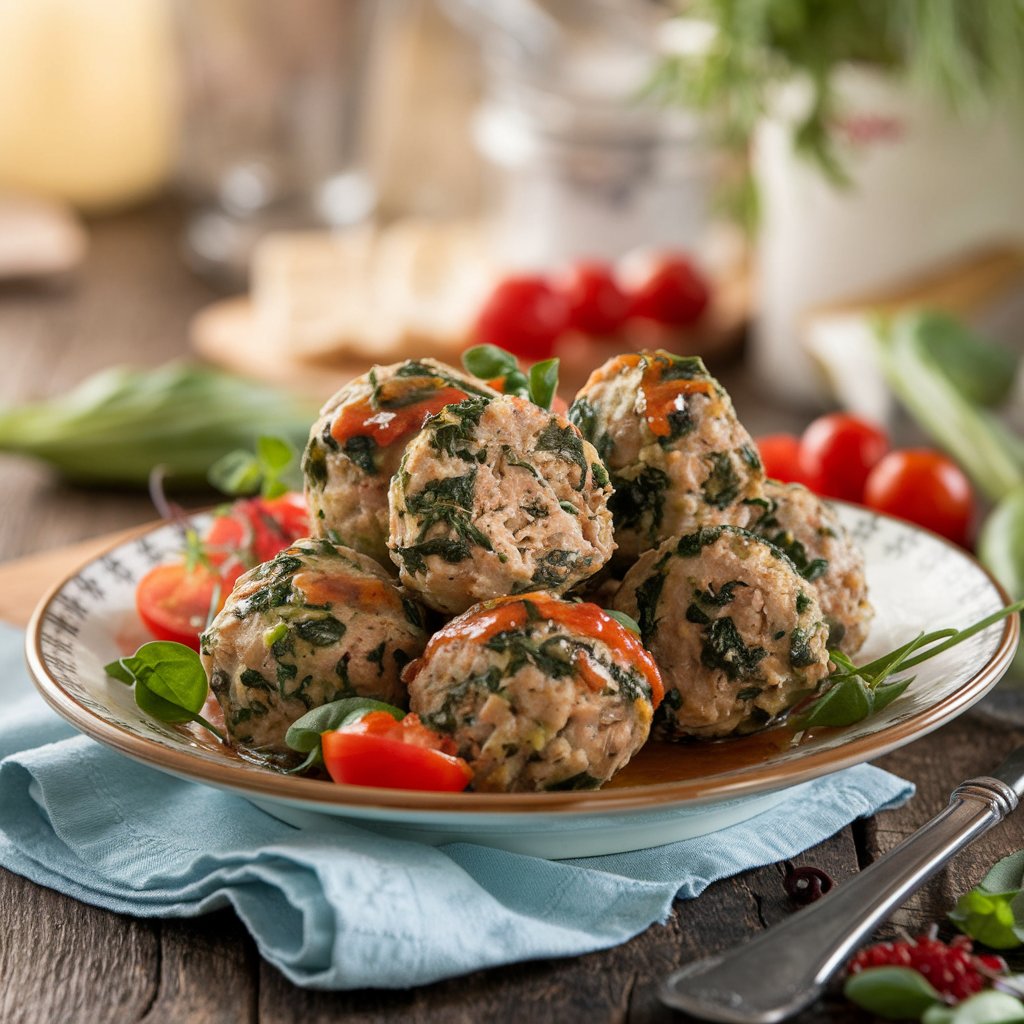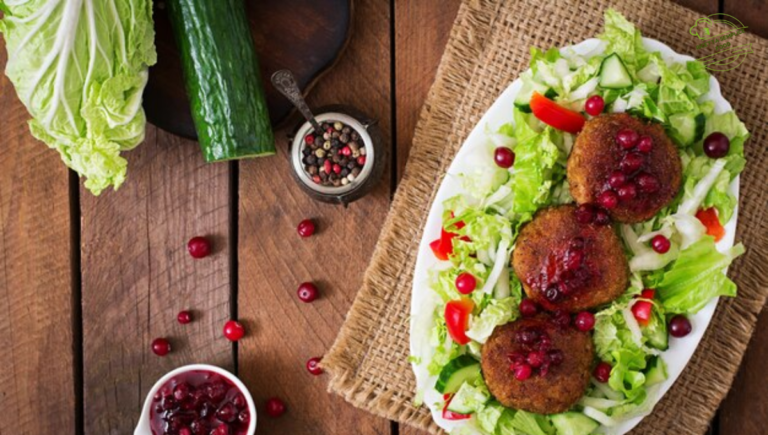Do Spinach Turkey Meatballs Require Binders? Unlock the Secret to Perfect Meatballs Every Time
Introduction
There’s something undeniably satisfying about preparing the perfect meatball. Whether you’re crafting a dish for a weeknight family dinner or serving guests at a special gathering, meatballs are one of those classic foods that never fail to impress. But when it comes to making spinach turkey meatballs, one question that comes up often is, do spinach turkey meatballs require binders?
As someone who’s passionate about cooking, you know that the perfect meatball is all about achieving the right texture: juicy, tender, and flavorful. Spinach turkey meatballs bring the added benefit of being lighter than their traditional beef or pork counterparts, but can they still hold together without the use of binders like eggs or breadcrumbs?
In this article, we’re going to break down everything you need to know about binders in spinach turkey meatballs, why they matter, and whether or not you can skip them altogether. We’ll explore various binder alternatives, offer tips for making moist and flavorful meatballs, and even provide a delicious recipe you can try at home. So, let’s dive in and discover how to make spinach turkey meatballs that will make your family come back for more!


Table of Contents:
- What Are Spinach Turkey Meatballs?
- The Importance of Bindings in Meatballs
- Do Spinach Turkey Meatballs Require Bindings?
- Types of Binders You Can Use
- Eggs
- Bread Crumbs
- Oats
- Cheese
- Ground Flaxseeds
- How To Make Perfect Spinach Turkey Meatballs Without Bindings
- Can You Make Spinach Turkey Meatballs Without Bindings?
- Tips for Making Juicy and Tender Spinach Turkey Meatballs
- Nutrition Facts: Spinach Turkey Meatballs vs. Traditional Meatballs
- Spinach Turkey Meatballs Recipe
- Frequently Asked Questions
- Conclusion
1. What Are Spinach Turkey Meatballs?
Spinach turkey meatballs are a healthier alternative to traditional beef or pork meatballs. By using lean ground turkey and fresh spinach, these meatballs provide a delicious way to reduce fat and increase the nutritional value of your meal. The turkey gives the meatballs a light texture, while the spinach adds color, flavor, and a dose of vitamins and minerals.
These meatballs are perfect for anyone looking to make a healthier choice without sacrificing taste. They’re great for anyone on a lean protein diet or those simply looking to incorporate more vegetables into their meals.
Whether you’re serving them as an appetizer, pairing them with pasta, or using them in a sandwich, spinach turkey meatballs are a versatile and flavorful option for any occasion.
2. The Importance of Bindings in Meatballs
Binders are an essential element in many meatball recipes, and they play a critical role in achieving the desired texture. Without a binder, your meatballs might end up too dry, crumbly, or unable to hold their shape during cooking. This is especially important when making spinach turkey meatballs because turkey meat tends to be leaner than beef or pork, which means it has less fat to help keep the meatballs moist.
Binders serve three primary functions in meatballs:
- Holding the Meatballs Together: Binders help ensure that the meatball mixture sticks together while cooking, preventing it from falling apart.
- Adding Moisture: Since turkey is a lean meat, binders add moisture to prevent the meatballs from becoming dry.
- Enhancing Texture: The right binder will help create a tender, juicy texture that complements the other ingredients in the meatball.
Some of the most common binders used in meatballs include eggs, breadcrumbs, oats, cheese, and even ground flaxseeds. Each of these ingredients plays a unique role in the overall texture and flavor of the meatballs.
3. Do Spinach Turkey Meatballs Require Bindings?
Now comes the big question: Do spinach turkey meatballs require binders?
The answer is that it’s generally a good idea to use binders when making spinach turkey meatballs, though it’s not strictly necessary. While spinach does add some moisture to the mixture, turkey meatballs on their own are prone to being dry and crumbly because of the lean nature of the meat. Without binders, the meatballs may not hold their shape or may become too tough or dry during cooking.
The moisture from spinach and turkey is often not enough to make the meatballs tender, so adding a binder will ensure they stay moist, juicy, and hold together well during cooking.
However, if you want to make meatballs without binders, it’s possible by adding extra moisture or using a combination of techniques, which we’ll explore in later sections.
4. Types of Binders You Can Use
There are many options when it comes to choosing a binder for your spinach turkey meatballs. Below are some common and effective binders that will help you achieve the perfect meatball every time.
Eggs
Eggs are one of the most commonly used binders in meatball recipes. They help bind the ingredients together and provide additional moisture to keep the meatballs juicy. Eggs also help give the meatballs structure, allowing them to hold together during cooking.
- How to Use: For every pound of turkey, you can typically use one egg. Depending on the texture you want, you can use more or fewer eggs.
- Tip: If you’re trying to lower cholesterol or calories, you can use egg whites instead of whole eggs.
Bread Crumbs
Bread crumbs are another popular choice for binding meatballs. They not only help hold the meatballs together, but they also add texture. You can use plain bread crumbs or seasoned bread crumbs for added flavor.
- How to Use: About 1/2 cup of bread crumbs for every pound of turkey is usually a good starting point.
- Gluten-Free Option: If you’re making gluten-free meatballs, you can use gluten-free bread crumbs or ground rice.
Oats
Oats can serve as an excellent, healthy alternative to bread crumbs. They provide a chewy texture that works well in meatballs, and they’re a great option for anyone following a gluten-free diet.
- How to Use: About 1/2 cup of rolled oats can be substituted for bread crumbs in the same ratio.
- Bonus: Oats add fiber to your meatballs, making them a more nutritious choice.
Cheese
Cheese can double as a binder and a flavor enhancer. Hard cheeses like Parmesan or mozzarella can add richness to your meatballs while helping to bind the ingredients.
- How to Use: A 1/4 cup of grated cheese should be enough to bind the meatballs while giving them a deliciously cheesy flavor.
Ground Flaxseeds
Ground flaxseeds are an excellent option for those looking for a vegan or gluten-free binder. When mixed with water, flaxseeds form a gel-like substance that can help bind the ingredients together.
- How to Use: Mix 1 tablespoon of ground flaxseeds with 3 tablespoons of water. Let it sit for a few minutes until it becomes gel-like, then add it to the meatball mixture.
- Bonus: Flaxseeds are rich in omega-3 fatty acids and fiber, making them a nutritious addition.
5. How To Make Perfect Spinach Turkey Meatballs Without Bindings
While binders are generally recommended for spinach turkey meatballs, it is possible to make them without binders if you use other methods to keep them moist and well-formed. Here are some tips:
- Use Higher Fat Turkey: Instead of using super-lean turkey, try using turkey with a slightly higher fat content to keep the meatballs moist.
- Add More Vegetables: Vegetables like grated zucchini or carrots can help add moisture to your meatball mixture, reducing the need for a binder.
- Chill the Mixture: Chilling the meatball mixture before cooking can help the ingredients stick together better, even without a binder.
- Don’t Overmix: Overmixing your meatball mixture can result in dense meatballs. Be sure to mix just until the ingredients are combined.
6. Can You Make Spinach Turkey Meatballs Without Bindings?
Yes, you can make Spinach turkey meatball recipe without traditional binders, but it requires more attention to detail. By using moist ingredients, cooking techniques, and ensuring the meatballs are well-chilled, you can create a version that holds together even without eggs, breadcrumbs, or oats.
7. Tips for Making Juicy and Tender Spinach Turkey Meatballs
To ensure your Spinach turkey meatball recipe turn out perfectly every time, follow these expert tips:
- Don’t Overwork the Mixture: Mix the ingredients just enough to combine them; overmixing can result in tough meatballs.
- Use Moisture-Rich Ingredients: Incorporate moist ingredients like spinach, zucchini, or even a little olive oil to keep the meatballs tender.
- Bake, Don’t Fry: Baking meatballs in the oven allows them to cook evenly and maintain their shape, while frying can lead to uneven cooking.
- Chill Before Cooking: Let the meatballs chill for at least 30 minutes before baking to help them hold their shape.
8. Nutrition Facts: Spinach Turkey Meatballs vs. Traditional Meatballs
When comparing Spinach turkey meatball recipe to traditional beef or pork meatballs, it’s clear that the turkey version is a healthier option. Here’s a breakdown:
| Nutritional Information | Spinach Turkey Meatballs | Traditional Meatballs |
|---|---|---|
| Calories per Serving | 200 kcal | 250 kcal |
| Protein | 25g | 20g |
| Fat | 10g | 15g |
| Fiber | 2g | 0g |
| Vitamin A | 35% DV | 0% |
As you can see, turkey meatballs have fewer calories, less fat, and more fiber, making them a better option for a health-conscious diet.
9. Spinach Turkey Meatballs Recipe
Here’s a simple and delicious recipe to try:
Ingredients:
| Ingredient | Quantity |
|---|---|
| Ground Turkey | 1 lb |
| Fresh Spinach | 1 cup |
| Egg | 1 |
| Bread Crumbs | ½ cup |
| Parmesan Cheese | ¼ cup |
| Garlic (minced) | 2 cloves |
| Salt and Pepper | To taste |
Instructions:
- Preheat oven to 375°F (190°C).
- In a large bowl, combine all ingredients and mix well.
- Form the mixture into meatballs.
- Place on a baking sheet lined with parchment paper.
- Bake for 20-25 minutes or until golden brown.
10. Frequently Asked Questions
Do Spinach Turkey Meatballs Need Binders?
Yes, Spinach turkey meatball recipe generally benefit from the use of binders. Binders help to hold the meatballs together, providing structure and preventing them from falling apart during cooking. Since turkey is a lean meat with minimal fat content, binders also help retain moisture, ensuring the meatballs remain tender and juicy. Common binders include eggs, breadcrumbs, oats, and cheese. However, if you’re looking for a lighter or gluten-free option, there are alternatives like ground flaxseeds or almond flour that can also work well.
Can I Make Spinach Turkey Meatballs Without Eggs?
Yes, you can make Spinach turkey meatball recipe without eggs! If you’re following a vegan or egg-free diet, you can use other binding ingredients that still help the meatballs stay together. Some popular substitutes for eggs in meatballs include:
- Ground Flaxseeds: When mixed with water, flaxseeds form a gel-like consistency, making them an excellent egg replacement.
- Breadcrumbs: Traditional or gluten-free breadcrumbs can be used to help bind the ingredients together.
- Cheese: Parmesan or mozzarella can also act as a binder while adding a rich, cheesy flavor.
- Oats: Rolled oats can help with moisture retention and add texture without the need for eggs.
You may need to experiment with the amounts to achieve the right consistency, but it’s definitely possible to make egg-free Spinach turkey meatball recipe.
For more recipe inspiration and cooking tips, check out this Chicken Cutlets with Mushrooms and Spinach Recipe. This dish is a great example of using fresh ingredients and healthy substitutes in your cooking!
How Do I Prevent Spinach Turkey Meatballs from Being Dry?
To prevent Spinach turkey meatball recipe from being dry, there are several tips you can follow:
- Add Moisture-Rich Ingredients: Including ingredients like spinach, zucchini, or even a small amount of olive oil can add moisture to the meatballs, preventing them from drying out.
- Don’t Overmix: When mixing the meatball ingredients, be careful not to overwork the mixture, as this can result in tough meatballs. Gently combine the ingredients until just mixed.
- Use a Higher Fat Turkey: If you’re using very lean turkey, consider using turkey with a slightly higher fat content, which will help keep the meatballs moist.
- Bake Instead of Fry: Baking your meatballs in the oven can help them cook more evenly, preserving their moisture better than frying.
What is the Best Way to Cook Spinach Turkey Meatballs?
The best method for cooking Spinach turkey meatball recipe is baking. Baking allows the meatballs to cook evenly, ensuring they stay tender and juicy without becoming greasy. Preheat your oven to 375°F (190°C) and bake the meatballs for about 20-25 minutes, or until they’re golden brown and fully cooked through. You can also use a non-stick skillet or an air fryer for a quicker cooking method, but baking remains the most effective way to ensure perfect texture.
Conclusion
Making spinach turkey meatballs is a great way to enjoy a healthier version of this classic dish. While binders play an important role in ensuring the meatballs hold together and stay moist, there are plenty of ways to make them work even without binders. Whether you’re looking for a gluten-free alternative or simply want to skip the eggs, there are several options to choose from.
Now that you’ve got all the tips and tricks, it’s time to put them into action and create the perfect Spinach turkey meatball recipe. Happy cooking!
